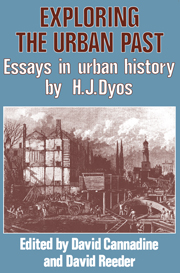Book contents
- Frontmatter
- Contents
- Acknowledgements
- Introduction: H. J. Dyos and the urban process, by David Reeder
- Part One The Urbanising World
- Part Two Transport and Urban Transformation
- Part Three The Urban Fabric
- 9 The slums of Victorian London
- 10 The speculative builders and developers of Victorian London
- 11 A Victorian speculative builder: Edward Yates
- 12 A guide to the streets of Victorian London
- Conclusion Urban history in the United Kingdom: the ‘Dyos phenomenon’ and after, by David Cannadine
- Appendix: A bibliography of the published writings of H. J. Dyos
- Notes
9 - The slums of Victorian London
Published online by Cambridge University Press: 03 February 2010
- Frontmatter
- Contents
- Acknowledgements
- Introduction: H. J. Dyos and the urban process, by David Reeder
- Part One The Urbanising World
- Part Two Transport and Urban Transformation
- Part Three The Urban Fabric
- 9 The slums of Victorian London
- 10 The speculative builders and developers of Victorian London
- 11 A Victorian speculative builder: Edward Yates
- 12 A guide to the streets of Victorian London
- Conclusion Urban history in the United Kingdom: the ‘Dyos phenomenon’ and after, by David Cannadine
- Appendix: A bibliography of the published writings of H. J. Dyos
- Notes
Summary
How much do we know about what it meant to be alive in a Victorian slum? How much can we know about an experience which was remote from almost all those who wrote about life in the towns or took oral evidence about it for various commissions of inquiry? Perhaps nothing reveals more ruthlessly how little we do know about urban culture in Victorian England than a survey of the secondary sources from which its slumminess may be discerned, nor makes that evidence more fragile than reflecting on what it is bound to omit. The sheer bodily sensations to be had from the daily round of slum life, the emotional demands it made and the responses it evoked, the mental reactions to the special miseries and the gaieties of living in the gutters of urban society - the real meaning, indeed, of life at certain levels - are not contained now to any extent even in the archaeological remains of the slums of Victorian London, much less in any well-calendared archives. They have almost all gone. Smell - to take but one of the most evocative elements of the slums - has no historical dimension; yet it has always been one of their chief ingredients, a factor potent enough in the end to drive George Orwell from the ferret's cage he once occupied in a post-Victorian generation, or to put George Augustus Sala back on the streets - his nostrils filled beyond endurance with the stench of the bugs - after his attempt to doss down for the night in a slum eighty years before Orwell.
- Type
- Chapter
- Information
- Exploring the Urban PastEssays in Urban History by H. J. Dyos, pp. 129 - 153Publisher: Cambridge University PressPrint publication year: 1982
- 1
- Cited by



